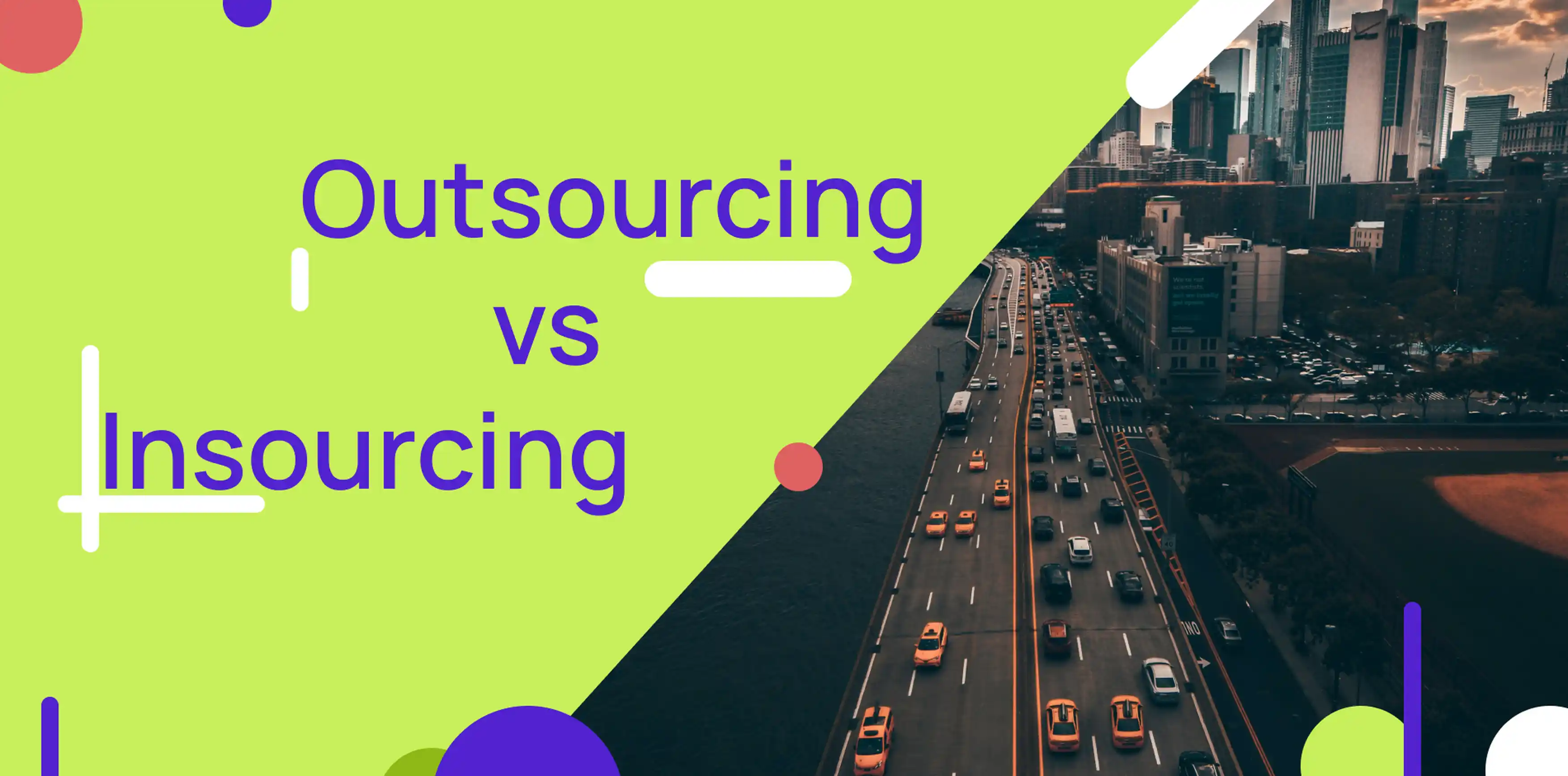May 6, 2025
Reading time: 11 minutes
A Comprehensive Guide to Outsourcing vs. Insourcing


Outsourcing and insourcing are two of the most popular business strategies used by companies today. Both strategies have their own advantages and disadvantages, and it is important to understand the differences between them in order to make an informed decision about which strategy is best for your business. In this article, we will discuss the pros and cons of outsourcing and insourcing, the benefits of each, and the cost associated with each strategy.
Outsourcing vs. Insourcing Definition
Outsourcing and insourcing are two contrasting business strategies that have been debated extensively in the corporate world. The former involves engaging with external entities, while the latter involves utilizing in-house resources to carry out business activities. These strategies are often employed to achieve specific goals such as cost reduction, enhanced efficiency, and improved quality of products or services.
Outsourcing has gained popularity over the years due to its potential to reduce costs associated with running a business. By outsourcing non-core functions, companies can focus on their core competencies and allocate resources more efficiently.
This approach also provides access to specialized skills and expertise that may not be available in-house, allowing businesses to gain a competitive advantage. However, outsourcing also presents challenges such as the risk of loss of control over processes, confidentiality concerns, and communication barriers.
On the other hand, insourcing offers numerous benefits to businesses, including increased control over processes, enhanced collaboration and communication, and the potential for improved quality.
By keeping processes in-house, businesses can exercise greater control over their operations, ensuring that they align with their strategic objectives. Additionally, this approach promotes a sense of ownership and accountability among employees, which can lead to increased motivation and productivity.
Outsourcing has gained popularity over the years due to its potential to reduce costs associated with running a business. By outsourcing non-core functions, companies can focus on their core competencies and allocate resources more efficiently.
This approach also provides access to specialized skills and expertise that may not be available in-house, allowing businesses to gain a competitive advantage. However, outsourcing also presents challenges such as the risk of loss of control over processes, confidentiality concerns, and communication barriers.
On the other hand, insourcing offers numerous benefits to businesses, including increased control over processes, enhanced collaboration and communication, and the potential for improved quality.
By keeping processes in-house, businesses can exercise greater control over their operations, ensuring that they align with their strategic objectives. Additionally, this approach promotes a sense of ownership and accountability among employees, which can lead to increased motivation and productivity.
Outsourcing vs. Insourcing - Pros and Cons
When deciding between outsourcing and insourcing, it is important to consider both the pros and cons of each strategy. Outsourcing can provide a number of advantages, such as:
However, there are also some potential drawbacks to outsourcing, such as:
On other hand insourcing can also provide a number of advantages, such as:
However, there are also some potential drawbacks to insourcing, such as:
- access to specialized skills and expertise,
- cost savings,
- increased efficiency,
- flexibility.
However, there are also some potential drawbacks to outsourcing, such as:
- lack of control over quality,
- potential language barriers,
- potential cultural differences.
On other hand insourcing can also provide a number of advantages, such as:
- increased control over quality,
- better communication between departments,
- improved customer service.
However, there are also some potential drawbacks to insourcing, such as:
- higher costs due to overhead expenses
- lack of access to specialized skills and expertise.
Benefits of Insourcing vs. Outsourcing

Are you torn between insourcing and outsourcing for your business needs? You're not alone. Many businesses struggle with the decision of whether to keep tasks in-house or outsource them to third-party providers. But fear not, because there are both short-term and long-term benefits to both options!
Insourcing allows you to have increased control over the quality of your work and better communication between your departments, leading to a more cohesive and efficient workflow. In the long-term, insourcing can even improve customer service and foster increased loyalty from your customers.
But don't count outsourcing out just yet! In the short-term, outsourcing can provide access to specialized skills and expertise that you may not have internally. This can help you tackle complex projects and ensure that they are completed to the highest standard. Plus, in the long-term, outsourcing can lead to significant cost savings and increased efficiency, thanks to lower overhead expenses and access to a larger pool of resources.
So, how do you decide which option is right for your business? It all comes down to weighing the short-term and long-term benefits of each strategy. Consider the unique needs of your business and how each option can help you meet those needs. With a bit of research and careful consideration, you can make an informed decision that will benefit your business for years to come!
Insourcing allows you to have increased control over the quality of your work and better communication between your departments, leading to a more cohesive and efficient workflow. In the long-term, insourcing can even improve customer service and foster increased loyalty from your customers.
But don't count outsourcing out just yet! In the short-term, outsourcing can provide access to specialized skills and expertise that you may not have internally. This can help you tackle complex projects and ensure that they are completed to the highest standard. Plus, in the long-term, outsourcing can lead to significant cost savings and increased efficiency, thanks to lower overhead expenses and access to a larger pool of resources.
So, how do you decide which option is right for your business? It all comes down to weighing the short-term and long-term benefits of each strategy. Consider the unique needs of your business and how each option can help you meet those needs. With a bit of research and careful consideration, you can make an informed decision that will benefit your business for years to come!
Cost of Outsourcing vs. Insourcing
Outsourcing typically comes with a more pocket-friendly price tag due to lower overhead expenses associated with hiring external providers. In some cases, it can be the more cost-effective option, especially if a company has access to specialized skills or expertise that would be challenging or expensive to acquire from an outside source. Moreover, insourcing can also result in lower overhead expenses since a firm utilizes internal resources.
Ultimately, the decision to outsource or insource boils down to a careful examination of the specific project or contract at hand, the provider's location, and the costs and benefits associated with each approach. By taking a holistic approach and analyzing the various factors, you can make a well-informed decision that best suits your organization's needs and budget.
Ultimately, the decision to outsource or insource boils down to a careful examination of the specific project or contract at hand, the provider's location, and the costs and benefits associated with each approach. By taking a holistic approach and analyzing the various factors, you can make a well-informed decision that best suits your organization's needs and budget.
Outsourcing vs. Insourcing - Summary
Choosing between outsourcing and insourcing is a decision that should not be taken lightly; it is important to consider both the pros and cons of each strategy in order to make an informed choice about which strategy is best for your business.
Outsourcing can provide access to specialized skills and expertise at a lower cost than insourcing; however, insourcing can provide increased control over quality and better communication between departments.
Ultimately, it is up to you as a business owner or manager to decide which strategy is best for your business needs. Consider both the short-term and long-term benefits of each strategy!
Outsourcing can provide access to specialized skills and expertise at a lower cost than insourcing; however, insourcing can provide increased control over quality and better communication between departments.
Ultimately, it is up to you as a business owner or manager to decide which strategy is best for your business needs. Consider both the short-term and long-term benefits of each strategy!
F.A.Q
What is the difference between insourcing and outsourcing?
Insourcing is the practice of keeping certain business operations and services within the company, while outsourcing involves contracting with an external provider to perform those same operations and services.
What are the pros and cons of insourcing vs. outsourcing?
The primary benefit of insourcing is that it allows a company to maintain control over its operations and services, while outsourcing can provide access to specialized expertise and cost savings. However, insourcing can be more expensive than outsourcing, and it can be difficult to find the right personnel to manage the operations.
What are the costs associated with insourcing vs. outsourcing?
The cost of insourcing depends on the size of the operation and the personnel needed to manage it. Outsourcing can be more cost-effective, as it eliminates the need for in-house personnel and can provide access to specialized expertise. However, there may be additional costs associated with outsourcing, such as contract fees and service fees.
Karol Andruszkow
Co-founder and CEO of Concept21
Co-founder and CEO of Concept21
Karol is a serial entrepreneur, e-commerce speaker, and founder of 3 startups. He advised hundreds of companies and led projects worth over EUR 50 million for financial institutions across Europe.
He earned two master's degrees – Computer Science and Marketing Management – in Poland and Portugal. He has 10+ years of experience in Silicon Valley, Poland, Portugal, USA, and UK, helping startups, financial institutions, and SMEs improve operations through digitization.
He earned two master's degrees – Computer Science and Marketing Management – in Poland and Portugal. He has 10+ years of experience in Silicon Valley, Poland, Portugal, USA, and UK, helping startups, financial institutions, and SMEs improve operations through digitization.
Karol Andruszkow
Co-founder and CEO of Concept21
Co-founder and CEO of Concept21
Karol is a serial entrepreneur, e-commerce speaker, and founder of 3 startups. He advised hundreds of companies and led projects worth over EUR 50 million for financial institutions across Europe.
He earned two master's degrees – Computer Science and Marketing Management – in Poland and Portugal. He has 10+ years of experience in Silicon Valley, Poland, Portugal, USA, and UK, helping startups, financial institutions, and SMEs improve operations through digitization.
He earned two master's degrees – Computer Science and Marketing Management – in Poland and Portugal. He has 10+ years of experience in Silicon Valley, Poland, Portugal, USA, and UK, helping startups, financial institutions, and SMEs improve operations through digitization.
SHARE:

